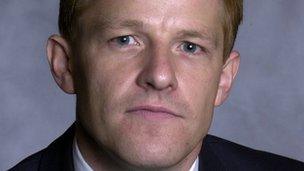Schools told to narrow gap between rich and poor
- Published

Mr Laws said much of the attainment gap was down to social inequality
Schools in England will no longer be rated as "outstanding" by inspectors if they fail to close the attainment gap between poor and affluent children.
Schools Minister David Laws said schools should not be relying on their brightest pupils to score well in inspections and league tables.
Mr Laws said there would be increasing focus on how well schools boosted the results of their disadvantaged pupils.
They must focus "relentlessly" on closing the achievement gap, he said.
Speaking at the annual conference of the Association of Teachers and Lecturers conference in Liverpool, he said: "The chief inspector [Sir Michael Wilshaw] has made clear that Ofsted will increasingly prioritise this area too.
"No school, however impressive, can be an 'outstanding school' if it is not achieving excellence for its most disadvantaged pupils.
"So, even where overall attainment is high, we want schools to focus relentlessly on closing this gap by improving outcomes for those from disadvantaged backgrounds."
'Intolerable'
Mr Laws told delegates it was "quite literally intolerable" that in some schools and certain areas of the country almost eight in 10 children on free school meals - a key measure of poverty - failed to get five good GCSEs, including maths and English. At GCSE level there is a 27% gap between the results of poor children and their peers, he said.
"This appalling gap between the life chances of poor children and the rest of the student population is a scar on the face of our education system in this country," he added.
Mr Laws said it would be "quite wrong" to blame teachers for this "miserable outcome" for those children as the gap was caused largely by inequalities in society.
But he said schools could rise to the challenge and make full use of the pupil premium - a payment worth around £900 per eligible pupil from this September - which has been designed to help schools raise results for poorer children.
"And I now need your help to show that the pupil premium is working and that it will close that gap between the outcomes of rich and poor children."
Olive branch
Mr Laws also appeared to offer an olive branch to teachers, saying they did one of the most important jobs in the country.
Mr Laws said schools currently had one of the best generation of teachers and "we should be willing to acknowledge that".
"Too often, politicians talk about education as if we have some unique monopoly of high aspirations for our young people
"But... I have yet to find anyone who works in education who is complacent about the huge gaps between the educational outcomes for children from rich and poor backgrounds."
He added: "We do appreciate the job you do - genuinely and sincerely."
His conciliatory words come after delegates passed a motion of no confidence in Education Secretary Michael Gove and the Chief Inspector for Schools in England, Sir Michael Wilshaw.
ATL members said the pressure put upon the teaching profession by both men was "horrendous".
ATL general secretary Mary Bousted had also raised concerns about Mr Gove's "wrong-headed" policies.
- Published27 November 2012
- Published11 July 2011